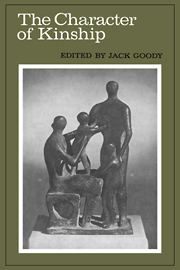Book contents
- Frontmatter
- Contents
- Dedication
- Introduction
- KINSHIP AND DESCENT
- THE NATURE OF KINSHIP
- THE NATURE OF THE FAMILY
- MARRIAGE AND AFFINAL ROLES
- Some Aspects of Levirate
- Polygyny, Economy and the Role of Women
- From Varna to Caste through Mixed Unions
- Bibliography of the Writings of Meyer Fortes
- References
- Index
Polygyny, Economy and the Role of Women
Published online by Cambridge University Press: 07 May 2010
- Frontmatter
- Contents
- Dedication
- Introduction
- KINSHIP AND DESCENT
- THE NATURE OF KINSHIP
- THE NATURE OF THE FAMILY
- MARRIAGE AND AFFINAL ROLES
- Some Aspects of Levirate
- Polygyny, Economy and the Role of Women
- From Varna to Caste through Mixed Unions
- Bibliography of the Writings of Meyer Fortes
- References
- Index
Summary
Many topics of interest to earlier writers have been abandoned by social anthropologists because they have involved the use of comparative rather than intensive techniques. But a whole range of problems can be dealt with only by means of comparison and the subject has been impoverished by our failure to utilise the full range of techniques available to us. And while we have lagged behind, other social scientists have tried to answer those questions in more adventurous ways.
The problem that concerns me in this paper is the relationship between plural marriage and women's position in the economy. It tries to make use of a regional comparison, using the available material from Ghana, and it attempts to set this specific comparison within a wider framework, taking into account the work of sociologists and economists as well as anthropologists.
Writing of life on the Gold Coast at the end of the seventeenth century, Bosman notes that each man marries as many wives as he pleases, but is ‘commonly contented with a number betwixt three and ten’ (1967: 198). The number is plainly too large for the wives of anyone but the well-to-do merchants with whom he associated. Among these rich men, two wives were exempted from labour, the chief wife who looked after the household and another who was consecrated to his god (obossum).
- Type
- Chapter
- Information
- The Character of Kinship , pp. 175 - 190Publisher: Cambridge University PressPrint publication year: 1974
- 7
- Cited by



